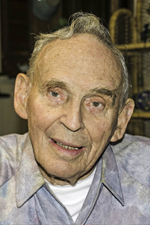Biography

Robert W. Schoning was born in 1923 in Seattle, Washington, where he was also raised. After completing high school, Schoning enrolled at the University of Washington, where he began what would become a decorated career as a handball player. The United States entered World War II during Schoning's second year of college, and because he knew he would be drafted, Schoning chose to enlist instead, ultimately joining the Marine Corps. He was also in the V-12 Navy College Training Program, which was designed to generate commissioned officers. He completed his Washington undergraduate degree in fisheries in 1944. The following May, he was commissioned and went overseas to China.
After returning from China in 1946, Schoning chose to stay in the active reserves. He went back to the University of Washington for graduate work in fisheries, but did not finish his master's studies. Instead, in 1947, he began working for the Oregon Fish Commission (OFC) as a field biologist stationed on the Columbia River. During this time, Schoning continued to play handball, ultimately winning over fifty titles in various tournaments.
In August 1950, Schoning was recalled to active military duty, and a month later his unit was sent to Korea, where he remained for the next year. Schoning was involved in the Chosin Reservoir campaign and was later awarded the Bronze Star for his courage in action. He remained a member of the active reserves until retiring from the military in 1972, by which time he had attained the rank of colonel.
After returning from Korea in 1953, Schoning resumed his work with the OFC, and over the next eighteen years he worked as fisheries biologist, Director of Research, and, ultimately, State Fisheries Director. He also continued playing handball, claiming third place in the 1968 national doubles tournament.
In 1971, after twenty-four years with the OFC, Schoning received an offer to move to Washington, D.C. and begin work as the deputy director of the National Marine Fisheries Service (NMFS), an agency within the National Oceanic and Atmospheric Administration. A year and a half later, in 1973, he became the director of the NMFS. In this capacity, he helped to formulate the Magnuson-Stevens Fishery Conservation and Management Act, which established a 200-mile fishery conservation zone buffering the shorelines of the United States. This piece of legislature made a massive impact on commercial fishing operations around the world, and nearly every other major fishing country later created a similar law.
In 1978, after seven years in Washington, D.C., Schoning returned to Oregon, joining Oregon State University's Department of Fisheries and Wildlife as a visiting professor. He remained at OSU until June 1982, at which point he switched his focus to activities as a private consultant. Named the Fishery Worker of the Year by the Oregon Chapter of the American Fisheries Society in 1985, Schoning returned to Oregon State in January 1986 as courtesy faculty with Fisheries and Wildlife. The following year, he received the OSU Distinguished Service Award. In 1995, he joined the advisory board of the Coastal Oregon Marine Experiment Station, and continued to serve in that capacity until finally retiring in 2011 at the age of eighty-eight. OSU's College of Agricultural Sciences named Schoning a Diamond Pioneer in 2002, and in 2007 he was inducted into the college's Hall of Fame.
Overall, Schoning worked for the government at various levels for fifty-three years. He also served for a combined total of fifteen years as a presidentially appointed commissioner on the International Pacific Halibut Commission and the International North Pacific Fisheries Commission. A member of the Military Officers Association of America, Schoning remains very active in local chapter affairs.

